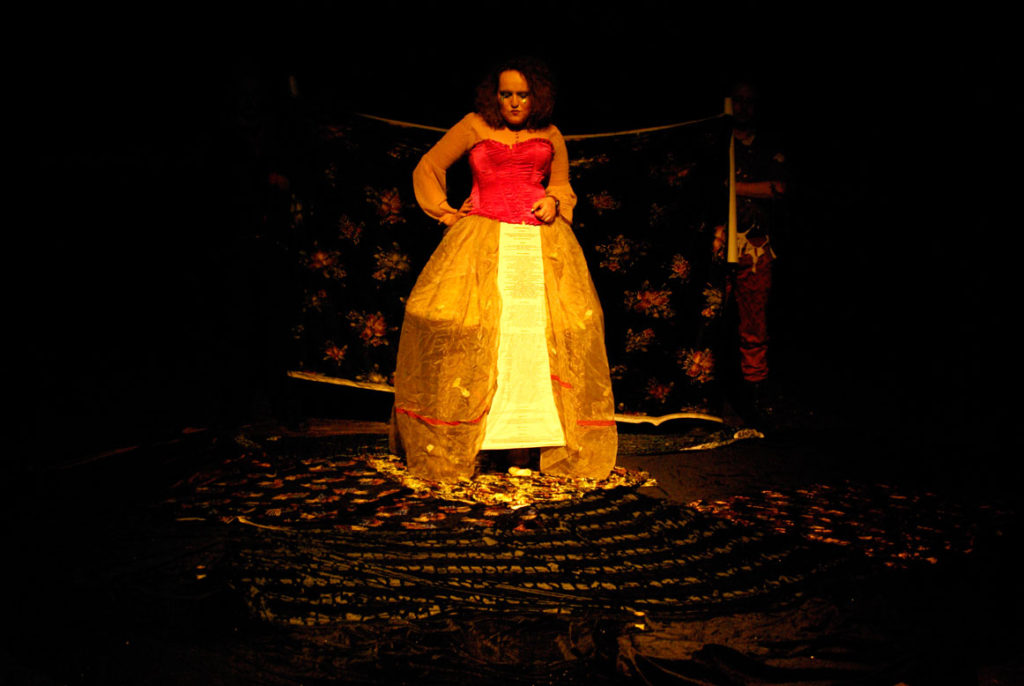
Sandra Jõgeva (1976) is an installation and performance artist, writer, critic and documentary maker. Her work stands out with its rhetoric opposing hierarchies, exposing inequality and the uneven distribution of resources.
Between 2001 and 2006 Sandra Jõgeva collaborated with Margus Tamm in the artist duo Avangard, referring to the taboo of using the term in contemporary art with its name. Avangard’s work was characterised by irony and provocation. Next, Jõgeva worked in the artist group Pink Punk (2003–2006, various members) that highlighted social issues: for example the selling of a person’s body, or the notion of prostitution in everyday relationships in the performance “Fair Deal” (2003), or marginalisation of “superfluous” people in society in “Happy holocaust” (2002). Pink Punk’s one of the more extreme examples of using an institutional art space was their performance “Wooligans” (2006), where the members of the group brought a herd of sheep to the cloakroom of Tallinn Art Hall.
In her solo practice Jõgeva also continues with the radical performances she is known for. Her performance “Südame külalisraamat” (Guestbook of the Heart, 2005) was based on the idea that the most important people (and events) leave a trace in a person’s heart. During the piece, Jõgeva got a tattoo on the left side of her chest, depicting a blank list that could be signed in the future. The performance was a collaboration with Peter Anderson and took place at the Living Art Museum in Reykjavík.
Jõgeva has also experimented with the medium of sculpture. She has created large gelatine female figures (“Millest on tehtud väikesed tüdrukud” (What Are Little Girls Made Of), 2009) as well as silicone, latex and caramel objects. The exhibition “Seisused” (Ranks, 2008, together with Kaarel Sammet) presented fake bronze statues made of plastic, textile, wigs and spray paint. It presented a cross-section of Estonian society – a middle age teacher, a gangsta rapper, an old photographer, a business man, a young actress – while hinting at their social status.
In the show “Meeleparandus” (Penitence, Draakoni Gallery, 2010), Jõgeva exhibited photos of anonymous women in frames made of sugar. Among other things, she used the gallery space for stand-up tragedy performances (15-minute performative talks). Jõgeva has continued developing the format of stand-up tragedy, presenting her text-based performances at Genialistide Klubi (2012) and Tallinn Art Week (2016). During these performances Jõgeva used elements of performance art, including fireworks, breathing fire, etc. In her latest performances, Jõgeva has focused on gossip in the art world, both on old and the newest rumours.
In Jõgeva’s work, one of the most prominent themes is the tension between dominance and submission. Based on the diary Jõgeva kept over several years while working as a dominatrix, she created the photo series “Domina aasta” (The Year of the Dominatrix, 2007), depicting the artist, dressed as a dominatrix, men working in high ranking positions and longing to be submissive. For the presentation of the series at the opening of the show “Sex Market” at Tallinn Art Hall, Jõgeva created the performance “Gauntlet”, where a group of women dressed as dominatrices were standing in a staircase and whipping male visitors entering and exiting the exhibition hall.
In the exhibition “Softcore” (2017) Jõgeva displayed photo collages printed on inflatable pillows with excerpts from her dominatrix diary. The 300 pillows and 14 canvases documented the first contact and feedback by anonymous clients. The pillow becomes a symbol of intimacy and the anonymity of the repetitive and reproducible interaction between the dominatrix and the client. The inflatable pillows also evoke the female blow-up doll, a caricature of an objectified woman, referring to fetishes.
Jõgeva was one of the coordinators of the art space Kunstikonteiner at Culture Factory Polymer, managing and coordinating its exhibition programme as well as the event series Global Container. Jõgeva is actively collaborating with various media outlets and among other things from 2010 to 2019 she was the editor and host of the art programme “Kultuuritehas” on Tallinn TV.
Her documentary debut “Love…” (2017) received the colleague award from the Estonian Documentary Guild (2017), Estonian Film and Television Awards prize, and the Annual Award of AV Division of Estonian Cultural Endowment (2018). She is currently working on the film “Kunst ja külm sõda. Esteetiline vastupanu” (Art and the Cold War. Esthetic Resistance) on the Soviet informal art scene and its ties to the West and a portrait film about Mare Tralla, an Estonian queer-feminist artist and activist.
Sandra Jõgeva studied painting at the Faculty of Fine Arts (BA, 2000) and at the Department of Interdisciplinary Arts (MA, 2002). She has received the Annual Award of the Visual and Applied Arts Endowment of the Estonian Cultural Endowment (2004) and the Betti Alver Literary Award for her collection of short stories “Draamapunkt” (2009).